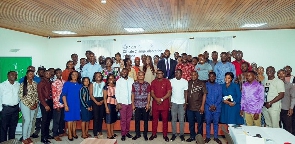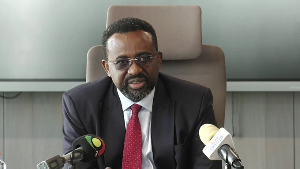Highlights the importance of locally led adaptation as a key approach to building resilience and safeguarding livelihoods in the face of climate-related risks.
The Africa Policy Research Institute (APRI), in close collaboration with the Ghana Climate Innovation Centre (GCIC), is proud to announce the launch of its flagship report on Locally led adaptation (LLA) titled ‘Unlocking Adaptation Potential: Insights into Ghana's Climate Change Policies, Initiatives, and Local Actions.'
This comprehensive report delves into the critical issue of climate change adaptation and explores locally-led strategies and initiatives to address the challenges posed by climate change in Ghana, identifying barriers and enabling factors for adaptation to inform the country's Nationally-Determined Contribution (NDC) implementation.
The report, which is based on rigorous research and case studies conducted across various agro-ecological zones of Ghana, highlights the growing impact of climate change on vulnerable communities and ecosystems. It sheds light on the importance of locally led adaptation as a key approach to building resilience and safeguarding livelihoods in the face of climate-related risks.
The report underscores the significance of placing local communities at the heart of climate change adaptation efforts. It showcases inspiring stories of communities taking ownership of their adaptation actions, leveraging traditional knowledge, and implementing climate-smart practices.
The adaptation initiatives showcased in the report further emphasize the need for fostering community participation, engagement, and ownership to achieve long-term sustainability.
In her welcome address, Rukayatu Sanusi, the Executive Director of the Ghana Climate Innovation Centre said that “the impact of climate change from coastal erosion to extreme weather events are evident in various sectors, including agriculture, health, and natural resources.
However, amid these adversities, we have witnessed the resilience and determination of local communities to rise above the challenges and protect their livelihood although not without challenges. This has been evident with the businesses in our incubator”.
In his keynote address, Dr Daniel Tutu Benefoh, the Acting Head of the Climate Change Unit provided an overview of the policy landscape in Ghana and showcased the progress made and the opportunities that lie ahead.
He stressed that “the Nationally Determined Contributions (NDCs) underscore the country’s commitment to climate action, with specific adaptation measures to build resilience across diverse sectors”.
He further re-iterated that the Unit welcomes “more exposure of the strategies, initiatives, and practices adopted by communities, driven by their aspirations to improve rural women's livelihoods, restore ecosystems, and assert their agency in the face of climate inaction; so that it can be well integrated into the implementation of the country’s NDCs”.
Presenting the report, Dr Albert Arhin, a Fellow of KNUST and APRI said that: “Today's launch is not just an event but a call to action. As such, let us leverage the insights from this report to foster collaboration, innovation, and inclusivity in our climate adaptation efforts”. The report highlights that:
1. Ghana faces significant climate change impacts, including coastal erosion, droughts, and floods affecting key sectors like agriculture and health.
2. The updated NDC emphasizes 13 adaptation measures among 47 programs and identifies key priority areas for adaptation as: development of resilient infrastructure, the promotion of livelihoods, strengthening of agricultural landscapes and food systems, urban planning, early warning systems, enhancing the climate resilience of women and vulnerable groups and promoting social inclusion.
3. In addition to the NDC, there are several policies and strategies that support Ghana's climate change agenda, including the National Climate Change Policy (NCCP), the National Climate Change Master Plan Action Programmes for Implementation (2015–2020) and the National Adaptation Policy Framework (2018).
4. A diverse range of stakeholders, including technical agencies, directorates, NGOs, the private sector, academic institutions, and international organizations, are involved in climate actions in Ghana. Despite this, there is a growing recognition among these stakeholders that the implementation of adaptation actions at the sub-national level is still lacking.
5. Local communities actively participate in a range of adaptation practices, including climate-smart agriculture, soil conservation, livelihood diversification, and ecosystem-based approaches. These engagements are driven by diverse motivations, such as enhancing rural women's livelihoods and incomes, restoring degraded ecosystems, safeguarding livelihoods, asserting individual and community agency, fostering resilience, and filling gaps left by government actions.
6. Locally led strategies and practices are enabling communities to reduce vulnerabilities and improve livelihood opportunities.
7. However, limited financial resources, inadequate institutional coordination and low support from government/public institutions and other relevant organizations continue to hinder the implementation of these locally led adaptation actions.
The report also provides wide-ranging recommendations and calls on the Ghanaian Government and the international community to:
1. Develop a clear focus on 'local' in locally led adaptation to better direct efforts and resources.
2. Enhance access to financial resources for local governments and communities involved in climate adaptation.
3. Invest in capacity-building programs for climate-smart agriculture and disaster risk reduction.
4. Recognize and support local climate change practices and initiatives.
5. Foster participatory decision-making processes to integrate local knowledge and perspectives.
6. Integrate traditional knowledge and practices into adaptation strategies.
7. Strengthen local institutions and governance structures for effective coordination.
Commenting on the launch of the report, representatives from communities and civil society organizations supporting some of the locally led adaptation emphasised that the Ghanaian government needs to invest heavily in locally led adaptation efforts and develop mechanisms to improve access to financial resources for local governments and communities, especially for small-scale farmers, fishermen, women's groups, and community-based organisations involved in climate adaptation initiatives.
Dr Olumide Abimbola, the Executive Director of APRI, stressed in his remarks about the report that “APRI has a dedicated focus to provide policy options and alternatives to African policymakers and civil society actors. This report, which is one of three similar reports being conducted in three African countries, is therefore a significant milestone in our collective efforts to address the urgent challenges of climate change in Ghana.
This is because it provides valuable insights into the power of locally led adaptation and the transformative potential it holds for building climate resilience at the grassroots level”.
Dr Grace Mbungu, Senior Fellow and Head of Climate Change Program at APRI emphasised that the “release of this report comes at a critical juncture, as the world grapples with the impacts of climate change. It serves as a call to action for policymakers, practitioners, civil society, and the international community to enhance support for locally led climate change adaptation strategies”.
She then commended the researchers, practitioners, and stakeholders who have dedicated their expertise and time to produce this comprehensive study.
The report identifies opportunities to align locally led adaptation initiatives with national climate policies, including Nationally Determined Contributions (NDCs) and National Adaptation Policy Frameworks.
The report and its executive summary are available at:
https://afripoli.org/projects/climate-adaptation/uploads/files/climate_adaptation_ghana_final_report.pdf
For media inquiries and interviews, please contact: Juliet at jbuntuguh@ghanacic.org or +233 24 663 1440
Press Releases of Friday, 11 August 2023
Source: Ghana Climate Innovation Center

















